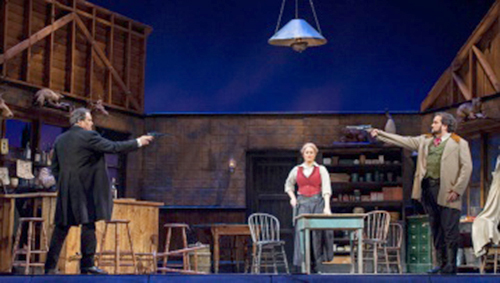BY Patrice Nolan

DETROIT – Michigan Opera Theatre has staged many favorites by Giacomo Puccini, but this spring season brings us a first – The Girl of the Golden West (la Fanciulla del West). Puccini delighted in setting his operas in novel or exotic settings and peopling them with unlikely characters, and when in 1907 he saw David Belasco's play in New York, he knew he had a story worth following Madame Butterfly. The setting is the California Gold Rush and his heroine is a charming woman named Minnie who runs the local saloon, is handy with a six shooter, and teaches Sunday School lessons to the gold prospectors who worship her. And yes – spoiler alert – she falls for the bad boy.
Although this is MOT's first production of The Girl of the Golden West, most audience members will recognize one of its essential musical themes, which Andrew Lloyd Webber appropriated as the love theme for Phantom of the Opera. When you hear the familiar melody in its original form, and see how Puccini used it to create a tender moment between the lovers, you may forgive ALW for subconsciously purloining the tune; it's just so lovely.
This is Puccini at the height of his powers, basking in his most shameless, go-for-the-heartstrings glory. The brilliant orchestration, embraced by Conductor Stephen Lord and the MOT orchestra, sweeps us irresistibly into the story and compels us to care deeply for the homesick miners, the loyal barkeep, the wandering minstrel, and the various characters who pass through Minnie's saloon in the opening scenes of the opera. Of course, this is all prelude to the soaring, melodious arias and duets that make Puccini such a favorite. It may take Detroit opera patrons a few minutes, in the opening scene, to get their heads around the idea of so many Gabby-Hayes-look-alikes singing in lush Italian while they gamble, brandish pistols and brawl. But once we surrender to the premise – a ripping good yarn with classic themes of hope, despair, and redemption – it is captivating.
Minnie is a woman with a heart of gold, and soprano Meagan Miller gives her a voice to match (Melissa Citro alternates on April 9). Although she is basically courted by every man in her saloon, she good naturedly acts as mother, sister, nurse and friend to all of them. Only the sheriff, Jack Rance, seems too insistent, aggressively declaring his ardor and forcing Minnie to refuse him. Baritone Mark Delavan, as Rance, has a thrilling voice and brings considerable acting skills to the role. It's a big role and he fills it to the corners. Rance may be the heavy in this story, but he also proves himself to be a man of honor – a man desperate for the love of a woman he can never have. It's not surprising, then, that when "Mr. Johnson," a stranger from Minnie's past, shows up unexpectedly, Sheriff Rance wants to run him out of town. Minnie manages to intercede, vouching for Johnson and leveraging the affection of the gold miners against Rance. When the men are called off to chase the notorious bandit, Ramirrez, Johnson is free to renew his acquaintance with Minnie and help her protect the miner's gold, which is hidden in her saloon.
The role of Johnson is sung with power and facility by tenor Rafael Davila, who recently starred as Don Jose in the Metropolitan Opera's Carmen. (Jeff Gwaltney alternates on April 9.) Johnson promises her that no one will steal the gold while he is with her, and she coyly invites him to her cabin after the men return. He shows up for coffee and, it turns out, true love's first kiss. Shortly after, the posse show up at her cabin and reveal that Johnson is in fact the bandit Ramirrez, whom everyone has been chasing. He is hiding in the cabin, but Minnie does not reveal Johnson; heartbroken, she sends him packing when she thinks the coast is clear. He declares his love for her, and vows to adopt a new way of life, but heads out into the winter storm. A shot rings out, and he staggers back to Minnie, wounded and defenseless. She tries to hide him, but the jealous sheriff appears, determined to get his man and win the girl all with a single bullet. Desperate to save the unconscious Johnson, Minnie challenges Rance to a winner-take-all poker game; she wins, and the furious Rance storms off into a howling blizzard.
In the final act, we learn that although Minnie has nursed Johnson back to health, he is once again on the run for past misdeeds. He is captured and, facing death at the hands of the sheriff and his lynch mob, makes a final request. In one of the most moving moments in the opera, we have the tender tenor aria "Quello che tacete," in which Johnson asks the men to lie to Minnie and let her believe that he has escaped both death and his wicked past. This short aria is the kind of shining gem that Puccini is so good at, and Rafael Davila serves it up with touching sweetness.
In fact, there are many fine moments in this opera and it is a perfect showcase for the gifted cast. The men of the MOT chorus shine under the direction of Suzanne Mallare Acton. It is always delightful to see the Michigan Opera Theatre Studio Artists on stage, and Jeff Byrnes is especially fine in the role of Sonora. The cast of this beautifully voiced production also features: Brent Michael Smith as Ashby, Harry Greenleaf as Jake Wallace, Joseph Michael Brent as Trin, Hadleigh Adams as Bello, Jonathan Blalock as Harry, Benjamin Robinson as Joe, Briana Elyse Hunter as Wowkle, Dennis Petersen as Nick, John McCullough as Sid, Nick Davis as Happy, Dominik Belavy as Larkens, Glenn Healy as Billy Jackrabbit, and Jesus Vicente Murillo as Jose Castro.
This production is superbly staged. Directed by Mario Corradi, the action is organic to the music and the story with clever bits of business to provide extra texture. The curtain rises to a glimpse of the gold miners at sunset, trying to wash the grime from their bodies before entering Minnie's saloon. When a brawl breaks out, Minnie shows up and shoots the bottle out of a Sonora's hand before he can clobber the sheriff with it. The original set design by Eugene Lee, with additional scenery by Scott Marr, feels authentic – setting the buildings (the saloon and, later, Minnie's cabin) against a vast expanse of western sky. This production is proof that grand opera is meant to be fun. The Girl of the Golden West is pure gold, and patrons should jump at the chance to see this rarely performed work while it's at Detroit Opera House.
This review appeared on originally EncoreMichigan.com. EncoreMichigan.com is Web-based publication focused on Michigan's professional theater industry.










